Medical marijuana is legal in 37 states but still prohibited by federal statute.
Olena Ruban
Though marijuana is legal for medicinal purposes in 37 states and Washington, DC — and recreationally in 18 — the use, possession or sale of cannabis remains prohibited by federal statute.
That’s created a significant disconnect that an increasing number of lawmakers are eager to reconcile: In a letter last month, Senate Majority Leader Charles Schumer, Senate Finance Committee Chair Sen. Ron Wyden and Sen. Cory Booker invited their colleagues to help draft legislation that would end the federal ban and lift state-sanctioned dispensaries out of legal limbo.
Legal US cannabis sales hit nearly $15 billion in 2021 and are on target to surpass $25 billion within the next three years. In 2021 alone, legislation fully legalizing the recreational use of pot passed in Connecticut, New Jersey, New York, New Mexico and Virginia — the first Southern state to do so. On Tuesday, New Jersey began accepting applications to open dispensaries, and Gov. Phil Murphy said the first shops could be open by this summer.
Here’s what to know about which states have legalized marijuana, the status of legalization efforts on the federal level and how Americans feel about legal weed.
What does federal law say about marijuana?
Under the Controlled Substances Act of 1970, the Drug Enforcement Agency still classifies cannabis — also known as marijuana, weed, pot and other terms — as a Schedule I drug, “with no currently accepted medical use and a high potential for abuse.” Growing, possessing or distributing marijuana is a violation of federal drug laws. (Other Schedule I drugs include heroin and LSD, while cocaine is listed as a Schedule II drug.)
In 2013, President Barack Obama directed the Justice Department to update federal marijuana enforcement policies to defer to state authorities in jurisdictions that had legalized marijuana, “based on assurances that those states will impose an appropriately strict regulatory system.”
Known as the Cole Memorandum, this guidance was rescinded in 2018 by Jeff Sessions, attorney general under President Donald Trump.
Marijuana legalization advocates have encouraged President Joe Biden to direct current US Attorney General Merrick Garland to reinstate the Cole memorandum.
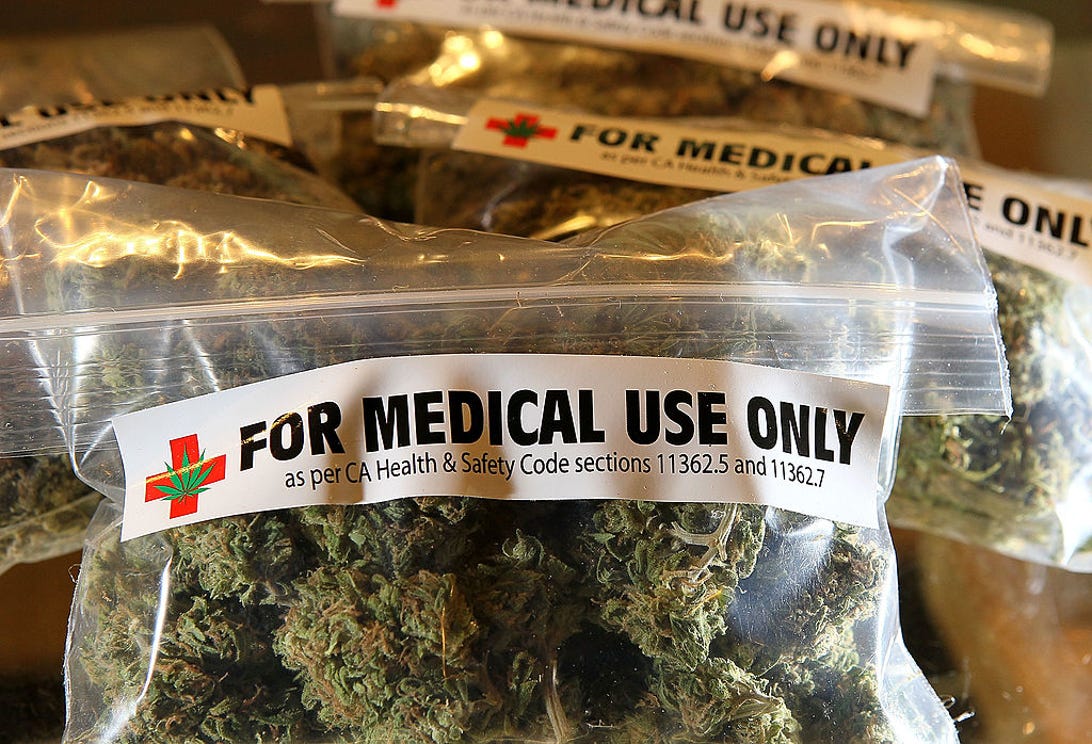
Thirty-seven states in all have legalized marijuana for medicinal purposes.
Justin Sullivan/Getty Images
Which states have legalized medical marijuana?
As of February, 37 states have legalized the medical use of cannabis: Alaska, Alabama, Arizona, Arkansas, California, Colorado, Connecticut, Delaware, Florida, Hawaii, Illinois, Louisiana, Maine, Maryland, Massachusetts, Michigan, Minnesota, Mississippi, Missouri, Montana, Nevada, New Hampshire, New Jersey, New Mexico, New York, North Dakota, Ohio, Oklahoma, Oregon, Pennsylvania, Rhode Island, South Dakota, Utah, Vermont, Virginia, Washington and West Virginia.
In addition, the District of Columbia and the territories of Puerto Rico, Guam, the Northern Mariana Islands and the US Virgin Islands have all legalized medical marijuana.
Each jurisdiction has its own criteria regarding what conditions cannabis can be prescribed for, at what amounts and what the process is for issuing medical marijuana licenses to qualified residents.
Lawmakers in Kansas are poised to pass medical-marijuana legislation, after a 2021 bill was pulled from the state Senate’s calendar. Now under debate within the Senate Federal and State Affairs Committee, the measure would allow doctors to recommend cannabis for chronic pain and specific conditions, including cancer, glaucoma, ulcerative colitis and Parkinson’s disease.
Which states legalized recreational marijuana?
According to the National Conference of State Legislatures, 18 states have legalized the adult use of marijuana for recreational purposes (and medical use, as well): Alaska, Arizona, California, Colorado, Connecticut, Illinois, Maine, Massachusetts, Michigan, Montana, New Jersey, New Mexico, New York, Nevada, Oregon, Vermont, Virginia and Washington.
In addition, recreational cannabis is legal in Washington DC, Guam and the Northern Mariana Islands.
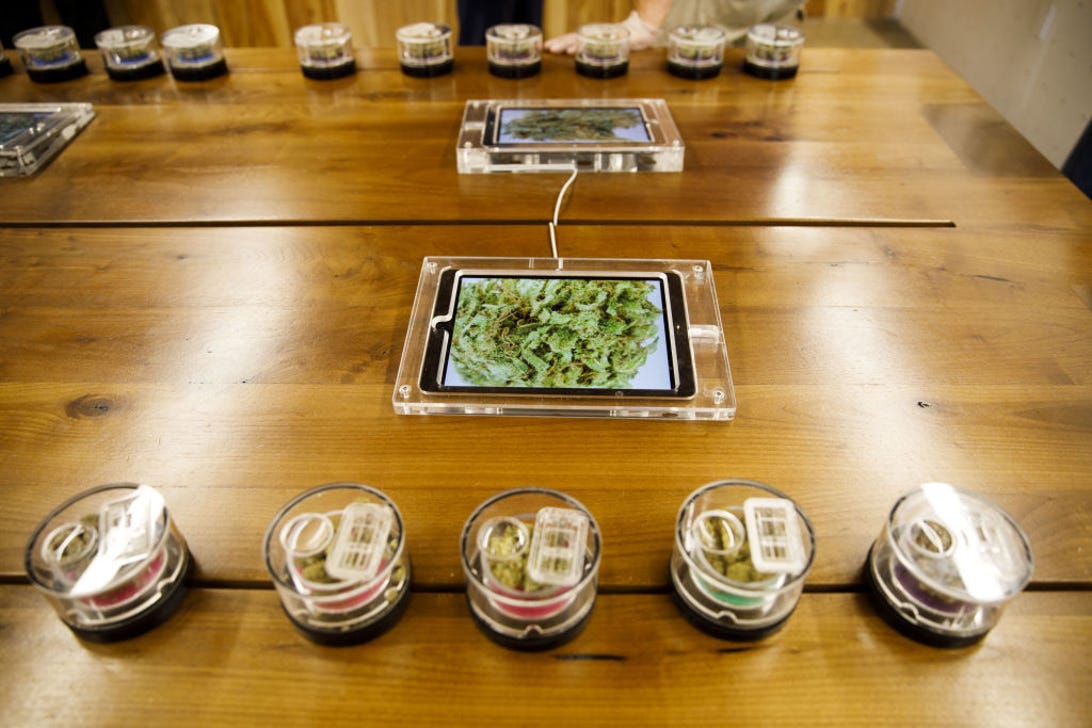
Different strains of marijuana at the MedMen dispensary in West Hollywood, California.
Patrick T. Fallon/Bloomberg/Getty Images
In South Dakota, a 2020 amendment to legalize recreational cannabis use passed with 54% of the vote but was struck down by the state Supreme Court a year later, following a lawsuit led by Republican Gov. Kristi Noem.
Georgia, Idaho, Indiana, Iowa, Kansas, Kentucky, Mississippi, North Carolina, South Carolina, Tennessee, Texas, Wisconsin and Wyoming have medical allowances for the legal possession of CBD (cannabidiol) products containing low levels of THC, the main psychoactive ingredient in cannabis, generally less than 3%.
In comparison, most legal dispensaries sell products with THC percentages of 25% and above.
What’s the difference between legalization and decriminalization?
Many states that have legalized marijuana initially decriminalized possession of a small amount.
Broadly speaking, cannabis “legalization” means passing laws that allow the buying, selling and possession of marijuana, usually with restrictions on the age of the consumer and the amount purchased.
Decriminalization, on the other hand, typically means that violating certain marijuana laws can still result in fines or other penalties but not criminal charges or jail time.
While neither Nebraska nor North Carolina has legalized cannabis for recreational or medicinal purposes, both states have decriminalized low-level marijuana offenses.
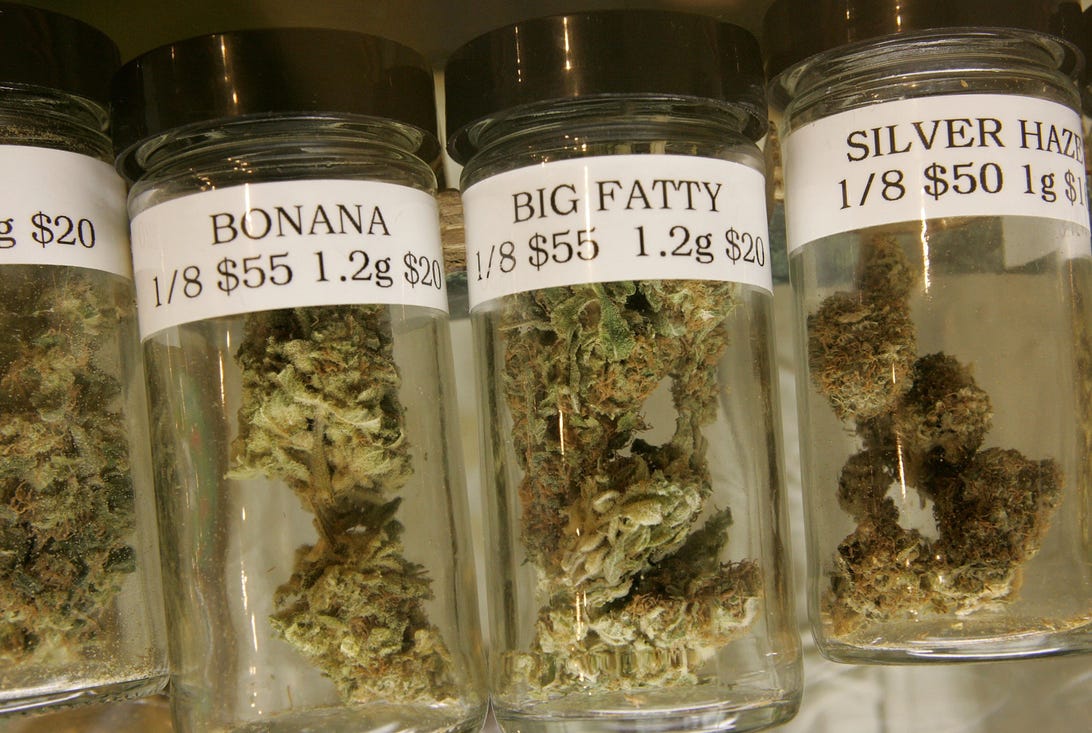
Containers of medicinal marijuana on display at the Alternative Herbal Health Services cannabis dispensary in San Francisco.
Justin Sullivan/Getty Images
In North Carolina, possession of half an ounce of marijuana or less is considered a Class 3 misdemeanor punishable by a $200 fine, “but any sentence of imprisonment imposed must be suspended.”
In Nebraska, the first-offense possession of an ounce or less is punishable by a maximum fine of $300 and a possible requirement to complete a drug education course. A second conviction is considered a misdemeanor, punishable by a maximum fine of $500. Subsequent convictions are also misdemeanors, punishable by a maximum fine of $500 and up to seven days in jail.
The US Virgin Islands decriminalized recreational marijuana in 2014, decreasing penalties for possession of an ounce or less from a $5,000 fine and a year in jail to a maximum $200 fine and no jail time.
Is Congress addressing cannabis legislation?
As more states legalize medical and recreational marijuana, more lawmakers want to square up federal laws so they don’t conflict with state regulations.
Senate Democrats are looking to introduce legislation this spring that would lift the federal ban on cannabis and allow states to establish their own guidelines.

The Senate could take up a cannabis legalization bill this session.
CNET/Marguerite Reardon
In a Feb. 10 letter, Schumer, Booker and Wyden, Democrats from New York, New Jersey and Oregon, respectively, invited their colleagues in Senate into the drafting process to help finalize this legislation. The letter requests input from the heads of relevant committees as well as senators who have dealt with “the challenges and realities of legalization in their own states.”
“As more and more states move to legalize cannabis for both adult and medical use, the federal government has an important role to play,” the letter reads. “Hundreds of millions of Americans live in states that have legalized cannabis in some form while it remains illegal at the federal level.”
That discrepancy “breeds confusion and uncertainty,” the senators said, and raises questions in areas from criminal justice reform to small business growth and public safety.
Last year, the three introduced a discussion draft of the Cannabis Administration and Opportunity Act “to right the wrongs of the past and ensure that the federal government is matching the advancements made in states across the country.”
In a February press conference, Schumer said he was hoping to introduce a formal bill as early as April that would remove federal prohibitions and allow states to establish their own guidelines.
“As majority leader, I can set priorities. This is a priority for me,” Schumer said, according to Bloomberg.
What does the Cannabis Administration and Opportunity Act do?
While Congress still has to hammer out the details, the CAOA would end “the failed federal prohibition of cannabis” if passed, according to the discussion draft.
The measure would automatically expunge federal nonviolent marijuana crimes and allow individuals serving time in federal prison for nonviolent marijuana crimes to petition for resentencing.
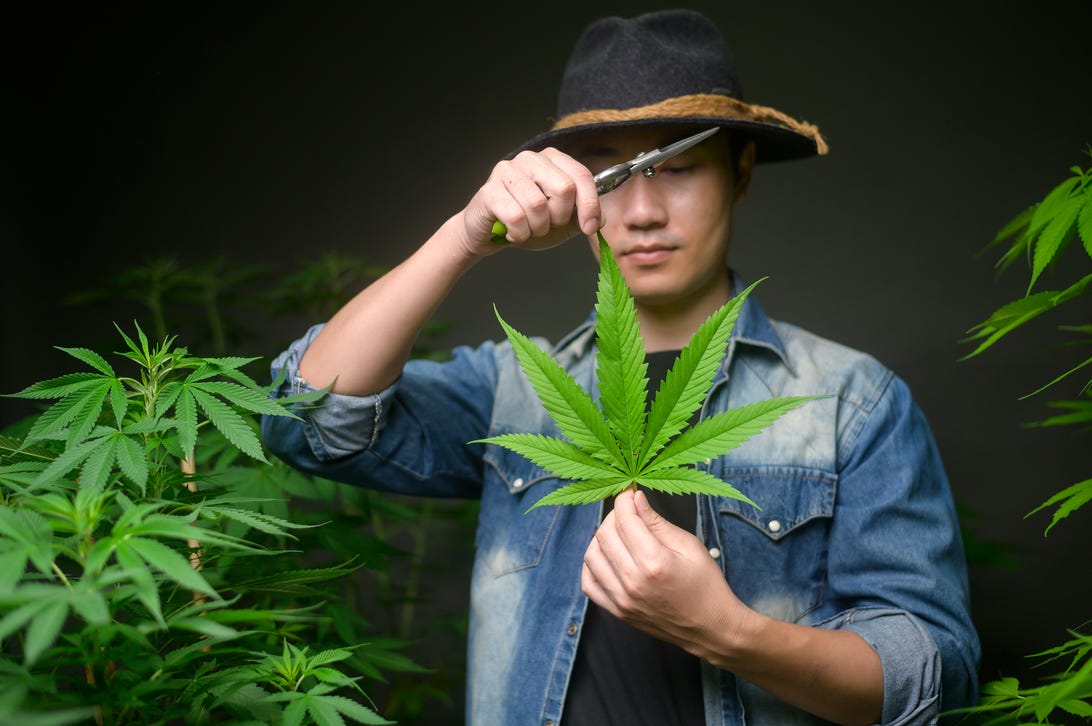
Tonefotografia
It would also put federal tax revenue from legal cannabis sales toward a fund “to reinvest in the communities most impacted by the failed ‘War on Drugs,'” and work to level the playing field for entrepreneurs of color who face barriers to entering the market.
The act gives state-compliant cannabis businesses access to financial services — such as bank accounts, loans and credit card transactions — and ends discrimination against medical marijuana patients and adult recreational consumers in federal public benefits.
Other efforts to change federal marijuana laws
There have been other recent bills aimed at reforming federal marijuana laws: The Marijuana Opportunity Reinvestment and Expungement Act passed the House in December 2020, the first time either chamber approved repealing federal marijuana prohibition. Like the CAOA, the MORE Act would deschedule cannabis from the Controlled Substances Act, expunge prior convictions and tax cannabis products to fund criminal reform and social justice projects.
Then-Sen. Kamala Harris of California, a Democrat, introduced a matching bill in the Senate in 2020, though it wasn’t taken up for consideration.
In November 2021, Rep. Nancy Mace, a Republican from South Carolina, introduced the States Reform Act, which would federally decriminalize marijuana — stopping short of full legalization but giving states more control in regulation.
Amazon has come out publicly in support of both Mace’s bill and the MORE Act.
On Feb. 4, as an amendment to the America Competes Act of 2022, the House passed the Secure and Fair Enforcement Banking Act, which would grant state-licensed marijuana businesses access to financial services. Rep. Ed Perlmutter, a Democrat from Colorado, first introduced the bill in 2019. He says he’s confident it will finally clear the Senate this session.
“I think this is the bill that’s going to break the ice, and then other things can be added or advocated for, over the course of the next few months or years,” Perlmutter told Yahoo News.
Does President Joe Biden support legalizing weed?
During the 2020 presidential campaign, then-candidate Joe Biden promised to “decriminalize cannabis use and automatically expunge prior convictions.”
According to Biden’s campaign website, “No one should be in jail because of cannabis use.”
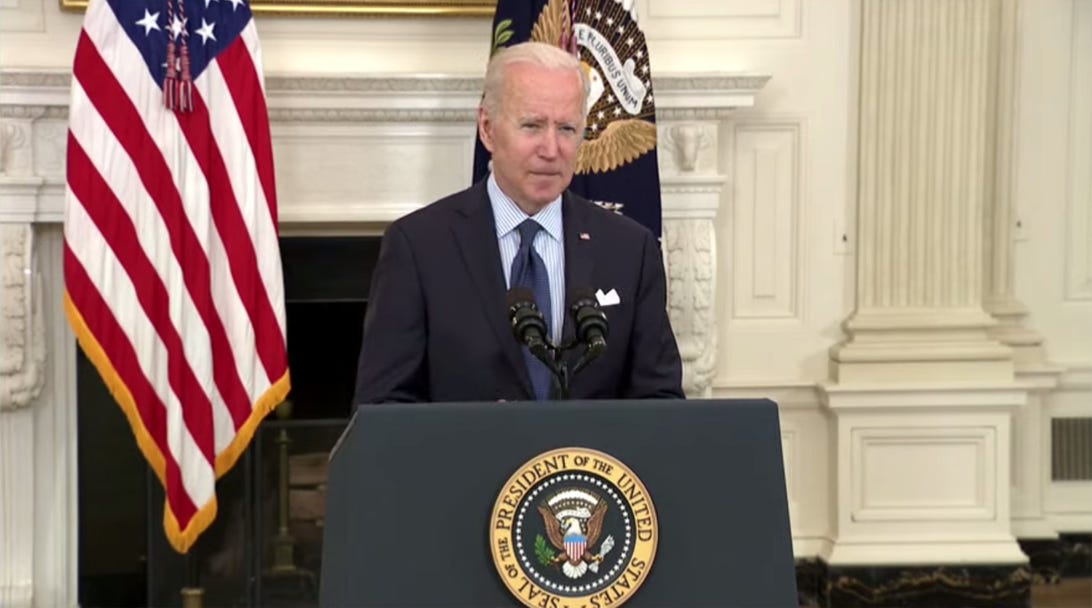
While campaigning for president, Joe Biden said he supported legalizing medical marijuana and leaving regulation of recreational weed up to the states.
Screenshot by Corinne Reichert/CNET
The site promised that, as president, Biden would “support the legalization of cannabis for medical purposes, leave decisions regarding legalization for recreational use up to the states, and reschedule cannabis as a schedule II drug so researchers can study its positive and negative impacts.”
While Biden as president can’t repeal federal marijuana laws on his own, he can grant amnesty to people with federal convictions for nonviolent marijuana-related crimes. He can also reinstate Obama-era guidance to the Justice Department not to prosecute low-level marijuana offenses or interfere with state marijuana laws
Biden could also throw his weight behind the Cannabis Administration and Opportunity Act or similar bills.
“Biden and his party both are in need of political wins, and relaxing marijuana laws — or fully legalizing the drug — is extremely popular,” Alex Shepard wrote for the New Republic in December.
How do Americans feel about legal marijuana?
According to a 2021 Pew Research poll, 91% of Americans believe cannabis should be legalized to some degree — 31% for medical use and 60% for both medical and recreational use.
Only 8% of respondents said marijuana should not be legal at all.
Support for decriminalization crosses party affiliation, with 47% of Republicans and Republican-leaning independents favoring legalizing marijuana for both medical and recreational use and an additional 40% for medical use alone.
That’s compared with the 72% of Democrats and Democratic-leaning independents who back legalization for both medical and recreational use and an additional 23% who want it legalized only for medical use.
The shift has grown through the generations, with 70% of Americans aged 18 to 29 backing legalization for recreational and medical use, compared with 46% of those 65 and older.


Be the first to comment